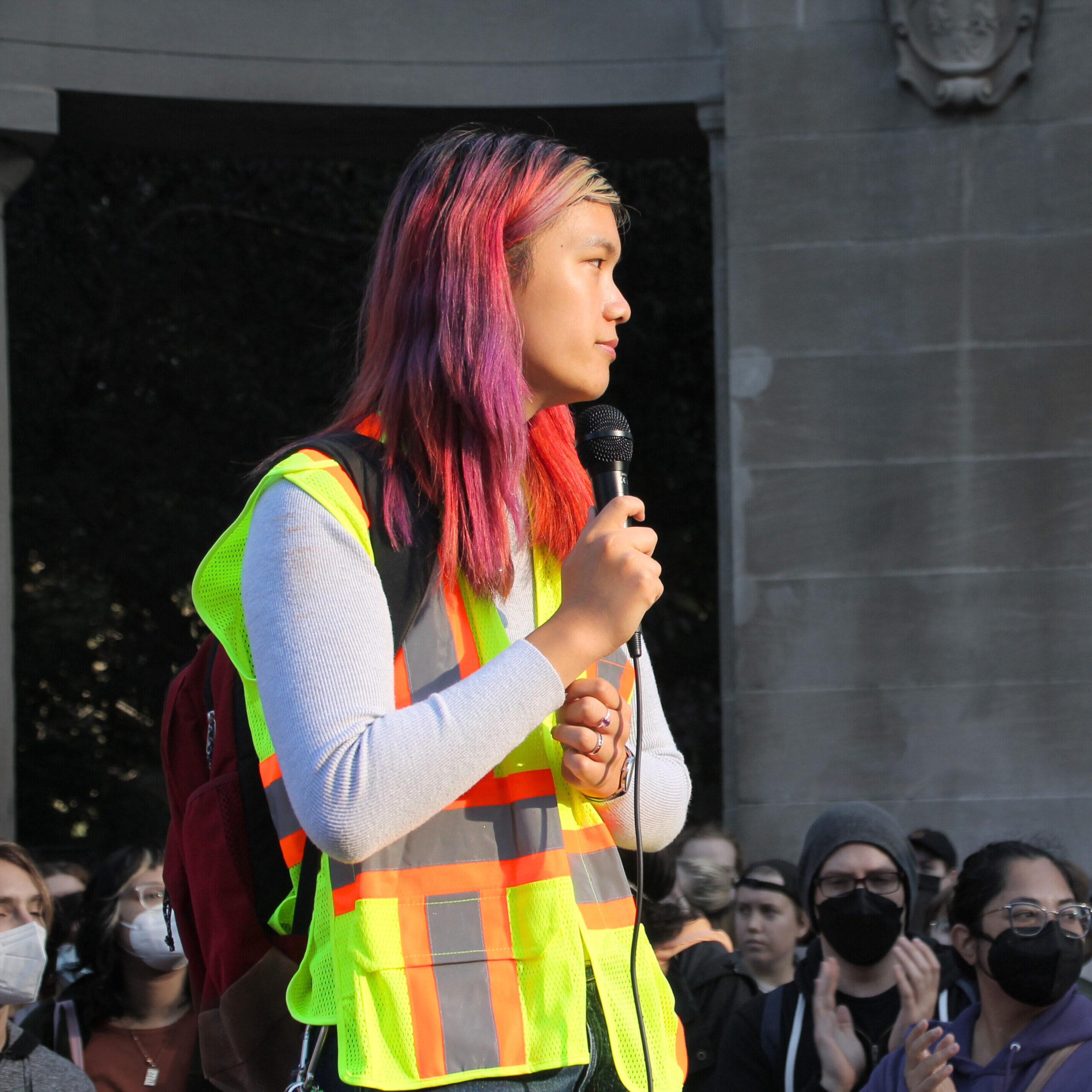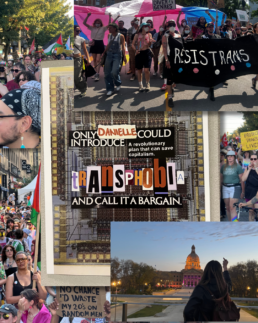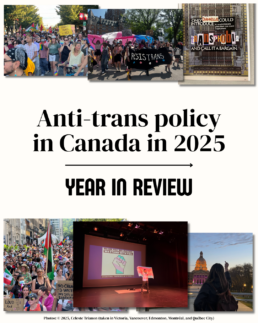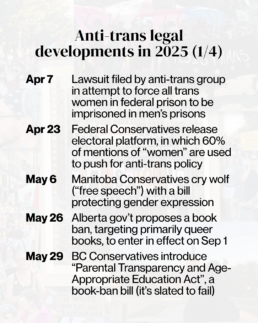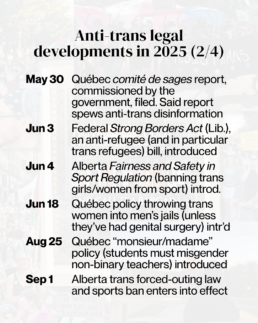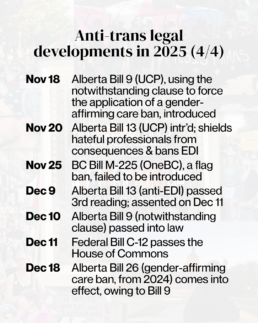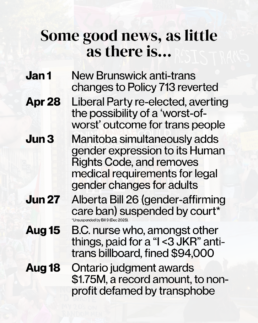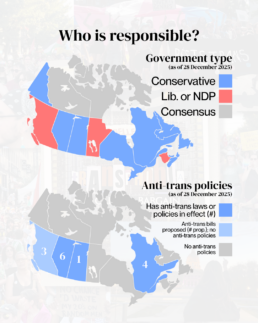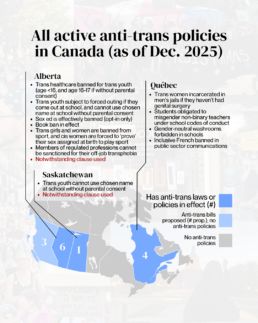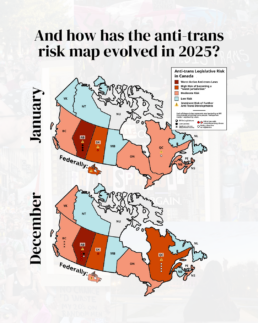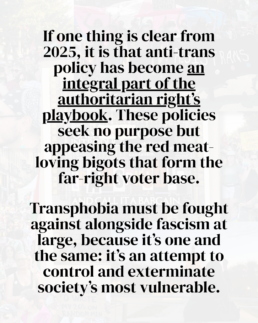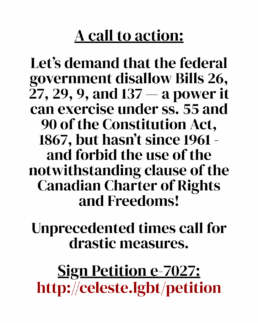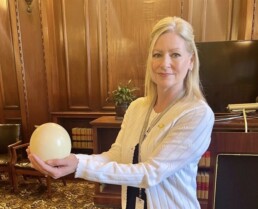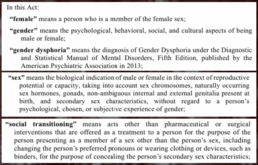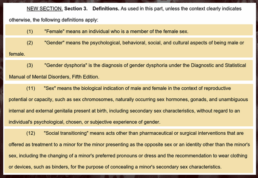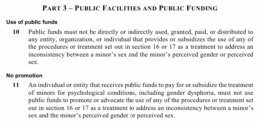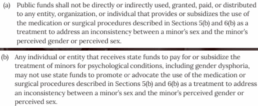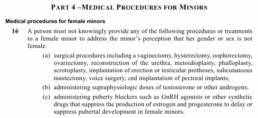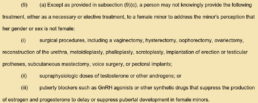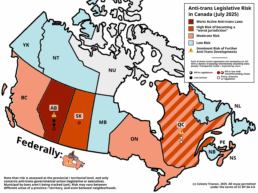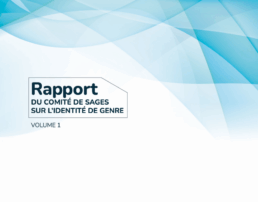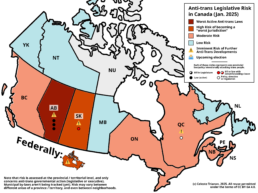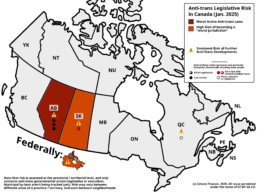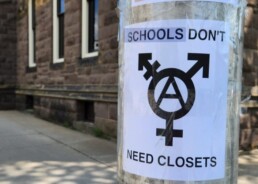2025 in Canadian anti-trans law and policy: a year in review
If there’s one way to summarize what 2025 has been like for trans people in Canada, it’s that shit’s been going down. Anti-trans laws have truly evolved from fringe idea to a core part of right-wing policy-making — despite the fact that lives are at stake. Here is a summary of how things have evolved in 2025.
| Date | What happened |
|---|---|
| April 7, 2025 |
Lawsuit filed by anti-trans groups in attempt to force all trans women in federal prison (serving 2+ year sentences) to be imprisoned in men’s prisons |
| April 23, 2025 |
Federal Conservative Party releases electoral platform, in which 60% of mentions of “women” are used to push for anti-trans policy |
| May 6, 2025 |
Manitoba Conservatives cry wolf, playing the “free speech” card, against a Manitoba NDP bill protecting gender expression |
| May 26, 2025 |
Alberta UCP government proposes a book ban, targeting primarily queer books (such as Gender Queer), to enter in effect at the beginning of the school year |
| May 29, 2025 |
BC Conservatives introduce “Parental Transparency and Age-Appropriate Education Act”, a book-ban bill (though it is bound to fail on the order paper) |
| May 30, 2025 |
Québec comité de sages report, commissioned by the government, filed. Said report spews anti-trans disinformation throughout |
| June 3, 2025 |
Federal Strong Borders Act (Bill C-2), an anti-refugee (and in particular trans refugees) bill, introduced by the Liberal Party |
| June 4, 2025 |
Alberta Fairness and Safety in Sport Regulation (banning trans girls/women from sport) introduced |
| June 18, 2025 |
Québec policy throwing trans women into men’s jails (unless they’ve had genital surgery) introduced |
| August 25, 2025 |
Québec “monsieur/madame” policy (forcing students to misgender non-binary teachers for 'civics' reasons) introduced |
| September 1, 2025 |
Alberta trans forced-outing law, trans women sports ban, and sex ed ban enters into effect; book ban modified to only attack queer graphic novels |
| September 18, 2025 |
Information leaked that Alberta would use notwithstanding clause to ban trans healthcare |
| September 24, 2025 |
Québec bans inclusive French in public sector communications |
| October 8, 2025 |
B.C. Bill M-216 (OneBC), a gender-affirming care ban bill modelled on U.S. anti-trans model legislation and containing the notwithstanding clause, introduced and failed at first reading |
| October 8, 2025 |
Anti-(trans)-migrant provisions in federal Bill C-2 split into Bill C-12 |
| October 25, 2025 |
Québec Bill 2 (CAQ) (concerning the compensation of doctors, & leading to HRT clinic closures) introduced and passed into law. Clinic closures are slated for 2026 |
| November 18, 2025 |
Alberta Bill 9 (UCP), using the notwithstanding clause to force the coming-into-effect of a gender-affirming care ban, introduced |
| November 20, 2025 |
Alberta Bill 13 (UCP) introduced. It shields hateful professionals from professional consequences, and bans mandatory equity, diversity and inclusion training by professional regulators |
| November 25, 2025 |
BC Bill M-225, a OneBC bill banning Pride and trans flags (in particular), failed at first reading |
| December 9, 2025 |
Alberta Bill 13 passes third reading |
| December 10, 2025 |
Alberta Bill 9 passes third reading |
| December 11, 2025 |
Federal Bill C-12 passes the House of Commons |
| December 18, 2025 |
Alberta Bill 26 (trans youth healthcare ban) comes into effect, after Bill 9 is used to reverse an injunction blocking said bill |
BC Bill M-216: Canada's worst anti-trans legislation thus far, but is it Canadian?
On October 8, 2025, B.C.’s new far-right party, OneBC, introduced its first piece of anti-trans legislation: Bill M-216, the “Protecting Minors from Gender Transition Act”.
The bill was voted down by BC NDP and Green MLAs at first reading, not even allowing the draft bill to become a bill per se at the B.C. Legislature.
Yet, many of the proposals in Bill M-216 are unprecedented in the Canadian context. It’s even worse than Danielle Smith’s proposals to ban trans-specific healthcare. for trans youth. Some of the proposals, such as GAC bans above age 18, unlimited liability for doctors and total bans on the use of chosen pronouns and names at school, have never been seen before in Canada. But why?
Because Bill M-216 is not Canadian.
It is actually an adaptation of U.S. anti-trans group “Do No Harm”’s model legislation, “The JUST FACTs Act”, which was also used in numerous anti-trans bills across the United States since 2023. Traces of Bill M-216 can be seen a bit everywhere in U.S. legislation: with Montana Senate Bill 99 (2023), with New Mexico Senate Bill 500 (2025), and with Kansas Senate Bill 63 (2025), amongst others.
It is, in essence, American anti-trans legislation, repackaged for Canada, complete with the notwithstanding clause — the same means by which Alberta’s UCP is currently attempting to commit genocide against trans youth.
Let me show you a few examples…
What would have Bill M-216 done? Well.. for short, it would devastate the lives of trans youth. It’d prevent them from accessing the healthcare they need to survive. Unlike Alberta’s similar anti-trans legislation, it’d extend all the way to youth aged under 19, making it Canada’s strictest such law. This prohibition would not apply only to surgeries (which is what the far-right loves screaming about so much), but also hormone therapy and puberty blockers, both understood to be part of the gold standard of trans healthcare. It would also enforce forced outing of trans youth in schools, and prohibit them from using gender pronouns that align with who they are — even with parental consent, another Canadian first.
It also introduces some unprecedented provisions in Canadian law. First, it implements a prohibition on “use of public funds” for allowing trans youth to transition, excludes Medical Services Plan (MSP) public health insurance coverage for trans youth’s transitions, and prevents the tax deductability of medical expenses relating to transition. It forbids the mere encouragement of social transition — the fact of going by another name, other pronouns, etc. in day-to-day life. It also forbids doctors’ professional liability from insuring their practice if they decide to give trans youth the healthcare they need — and puts a burden of unlimited liability on them, making it possible for them to be sued 25 years down the line, even if their (former) trans youth patient had consented to the healthcare in question. For reference, the statute of limitations in B.C. for typical court cases is 2 years after discovery.
Finally, it incorporates the notwithstanding clause — a first for legislation in B.C. — effectively immunizing said bill from judicial review, not just from the obvious violations of equality rights at stake, but the right to life, liberty and security of the person of trans youth, as well as their right to live without facing cruel and unusual treatment.
How is this even conscionable?
I’m not posting this article on my website as a means of stoking fear. Trans people, as is, already are facing genocidal conditions worldwide, including in the United States. Attacks on trans people have become a centrepiece of fascism worldwide. Yet, here we are. Where genocidal legislation can be introduced in provincial parliaments a bit all across Canada, without consequence.
The democratic process is supposed to be the consequence of the notwithstanding clause. Said clause was drafted with the assumption that Canadians will care about their human rights and the ones of their neighbours, and will vote out those who choose to throw them out. We’ve seen this logic fail, first in Québec, then in Saskatchewan. Will we allow this logic to continue to fail, until the Canadian Charter of Rights and Freedoms ends up merely as valuable as a piece of toilet paper? It’s our decision to make.
End note: Since bills struck at first reading do not appear on the B.C. Legislature’s website, I have taken the liberty to upload a copy of Bill M-216 onto the Internet Archive. You may find a copy there!
Alberta to use notwithstanding clause to more easily kill trans kids: leak
(The following is a modified transcription of a graphic I have previously shared on Instagram on September 18, 2025.)
This is unprecedented.
Danielle Smith’s far-right UCP government is now stating that the rights of trans youth and trans women should cease to exist.
By using the notwithstanding clause, Alberta is hoping to prevent its anti-trans laws — rooted uniquely in anti-trans prejudice — from being challenged in court. This also means that trans youth’s healthcare in Alberta will be imminently at risk, as it would overturn the Alberta Court of King’s Bench injunction in Égale Canada v Alberta.
This information has only been made public thanks to a leaked memo. Alberta’s planning on introducing this unprecedented measure at the Legislative Assembly at the end of October. Leaked. Does this give you confidence in Alberta’s government?
Kids will die.
The purpose of this legislation is extremely clear. It is to remove trans people from Alberta — whether through not transitioning, moving to other Canadian provinces or territories, detransitioning, or suicide. Alberta is already the most dangerous province for trans people in Canada, in particular because of its gender-affirming healthcare ban. Yet, it intends to make it even less safe — through potential bathroom bills, ID change bans, and other (currently speculated or leaked) attacks on trans existence. It is nothing less than fascist, or Trumpian.
This is a prime example of necropolitics — conferring, by legislative fiat, the status of subhumanity to every trans person in Alberta. And... Alberta knows that its laws will kill trans people. Hence why the notwithstanding clause becomes necessary: it’s a weapon of death.
Down with the UCP.
July 2025 Canadian Anti-Trans Risk Assessment Map
We’re halfway across 2025, a year which already is living in infamy as a year of attacks and rollbacks against trans people’s human rights. In Canada, despite some positive developments, we’re not exactly spared from it either. The risk of anti-trans developments remain, in particular in Canadian jurisdictions where right-of-centre governments are in power. Yet, there is reason for hope, especially as some provinces take a stance of leadership which is desperately needed in these rough times.
Changes since January 2025
- Federal: High risk with warning → Medium risk with warning
- Québec: Medium risk with warning → Medium/High risk
- New Brunswick: Medium risk → Low risk
About this map
Since I began tracking anti-trans developments in Canada (as early as 2021, when I was fighting against the initial iteration of Québec Bill 2), I’ve had people ask me: “I’m planning on moving to Canada, where should I move?”. This question, unfortunately, has been asked to me way too many times since January 2025, when Donald Trump seized power in the United States: promptly, our southern neighbours have become a no-go zone for trans people, with hundreds of thousands of internally displaced persons and (increasingly) refugees and de facto refugees. This question is equally relevant to trans Canadians themselves, as well as other trans migrants, who wish to be able to live and thrive in an environment where their existence isn’t consistently questioned.
I created my original anti-trans risk map in September 2023, inspired off of Erin Reed’s anti-trans risk map, as an exercise in visualizing anti-trans hate across Canada. At the time, nationwide protests against trans participation in public life were taking place, and Saskatchewan would become the second Canadian jurisdiction introducing such measures — whilst my home province of Québec promised to introduce its own homegrown brand of government-administered hate, a development which just occurred back in June.
Anti-trans legislation in Canada, whilst taking forms that are different from the U.S., remain similar: examples include gender-affirming care bans, Pride flag bans, and forced outing laws. Legal strategies used to defend such inhumane laws are almost equivalent. The influences behind anti-trans groups, both foreign-funded and domestically grown, are so marked that the Canadian Security Intelligence Service had to publish its own warning.
My focus is on documenting risk for both trans youth and adults, with the assumption that both are correlated. Most anti-trans legislation (and anti-2SLGBTQ+ legislation at large), within the Canadian context, either targets trans youth (targeting them either because they are under the age of majority, or because they are attending school) or trans women (see: transmisogyny).
New to this update: this map also divides anti-trans legislation into two categories: legislation with anti-trans intent (where the law is motivated by anti-trans animus), and legislation with anti-trans effect (laws which have a disproportionate effect on trans people, for instance a name change ban for people with criminal records). Whilst my focus is still on the former (which will be recorded using dots on the map itself), this change allows for bills and laws that will clearly jeopardize the well-being of trans people, such as BC’s Name Amendment Act No. 2 (2024) and the federal Strong Borders Act, to nonetheless face the criticism they deserve.
Note that this map only tracks legislated hate, and not the relative safety of different communities for trans folk across Canada. The unfortunate truth is that it’s extremely difficult to map out, say, the occurrence of hate crimes or other forms of hate. Do not rely on this map as a sole gauge of the state of transphobia in Canada; there are a lot of minute details which I simply cannot capture in one map!
Methodology
First and foremost, all jurisdictions are presumed to be of ‘moderate risk’. This should be understood as the default, and already takes into account the generalized social climate of anti-trans hate in Canada. From there, I rate each jurisdiction using qualitative measures, being notably the reach and severity of anti-trans legislation, as well as what the local Conservative Party (or equivalent) is discussing. Both the policies of the current party in power, the ones of any opposition parties with a certain likelihood of forming government, and polling for upcoming elections (with a higher weight going to imminent elections) are evaluated whilst qualifying a jurisdiction’s level of safety.
Any bill, policy, or law which actively harms a significant proportion of the trans community, or a socio-political climate favorable to making such legislation pass prior to or soon after the next elections, will bump a jurisdiction to ‘high risk’. The ‘worst anti-trans laws’ qualifier is reserved for jurisdictions which either ban gender-affirming care for trans youth, forcibly out trans youth to their parents, or otherwise has a combination of anti-trans laws and policies creating a climate so hostile to trans people that it would be analogous to a ‘worst jurisdiction’ under Erin Reed’s map.
On the other side of the spectrum, the ‘low-risk’ qualifier is reserved for jurisdictions which have either created policies and proposed & implemented laws supporting trans well-being, or shown to be willing to actively defend trans youth. Given that more porous nature of Canadian federalism than American federalism (for example, the Canadian federal government controls criminal law all across the country, unlike the U.S., where both states and the federal government have jurisdiction), “shield laws” per se can’t really exist in Canada, but any steps taken by a given government to defend trans people will be taken into account.
The worst jurisdiction: Alberta
Alberta continues to be the only Canadian jurisdiction to get the “worst anti-trans laws” label attached to it, for two main reasons: Alberta Bills 26 and 27, a ban on gender-affirming healthcare and a forced outing bill respectively. The latter also serves as a de facto sex ed ban.
Bill 26 has been temporarily enjoined in court, thanks to the efforts of Skipping Stone and Égale Canada, which launched a court challenge the day after the bill received royal assent. The Canadian Medical Association has also launched its own lawsuit over said bill. However, the Alberta government has both shown its intention to appeal said judgment, and use the notwithstanding clause — a move deemed “cruel and unnecessary” by Amnesty International Canada. Other moves by the United Conservative Party, the far-right party governing Alberta, includes drag bans, gender marker change bans, and further leeway for on-campus hate speech — moves which suggest that Alberta will not back down, no matter what the Canadian Charter of RIghts and Freedoms states.
Bill 27 has not been challenged in court thus far, but would likely face such a challenge in the months to come.
One another law targeting trans people in Alberta is active right now: Bill 29, a sports ban. Its regulations (and therefore, implementation), specify that any female athlete, age 12 and up, must be able to prove that they were “born female” to play; forces sports organizations, including recreational ones and ones who wish to stay inclusive, to implement a policy stating as such; and allows for vigilantes to challenge any female athlete’s sex assigned at birth, a measure that will inevitably lead to more transphobia both through the systematic exclusion of trans women, and the creation of a broader environment of “gender policing” that’ll affect all women athletes.
Finally, Pride flag bans implemented by the towns of Westlock and Barrhead back in 2024 remain active.
In second place: Saskatchewan
Saskatchewan continues to stand in the “high risk” category. Its unprecedented use of the notwithstanding clause of the Canadian Charter of Rights and Freedoms in Bill 137, a mechanism shielding laws from judicial review for breaches of fundamental freedoms as simple as the right to life, liberty and security of the person to impose a forced outing bill, cannot be understated. Trans youth will inevitably struggle in school owing to this law, as they face the risk of prejudice (though not forced outing). Even though Scott Moe, leader of the Saskatchewan Party, has backed down on his proposal to institute a change room ban for trans youth “on day one” in reaction to a news story about two trans girls using the changing room, Moe has demanded that every school have a publicly available policy on the matter — something which can shape things either for the better or for the worse.
It remains that there is a risk of further anti-inclusion legislation being introduced there, depending on the moral panic of the day.

In third place: Québec
Québec remains a bit of a wildcard, being culturally distinct from much of the rest of Canada. However, it has seen a marked and significant rise of government-approved anti-trans hate which warrants an increase in risk level — though, not yet to the same extent as Saskatchewan. The Québec Ministry of Education, since May 2024, requires that all new public school bathrooms be gendered — a measure introduced in the wake of public backlash against a teacher using “Mx.” as a title. Students in schools are also now required to use “Madame” or “Monsieur” (Ms. or Mr.) to address their teachers in school — a policy perhaps not with anti-trans intent, but clearly with an anti-trans effect.
The Québec government’s Comité de sages sur l’identité de genre, an advisory committee on trans people composed of three cisgender non-experts, has silently released a flawed report enabling anti-trans voices under the cover of anonymity. The Québec government itself has publicly stated its approval of said report. Perhaps even worse: the Québec government has undertaken steps beyond what said committee has stated — notably introducing a trans prisoner segregation policy, separating trans prisoners by genitalia in spite of there only being six (6) trans prisoners in Québec provincial jails (the report itself recommended a case-by-case approach with guidelines based on sincerity, amongst other criteria).
I have reasons to believe that the Québec government could introduce worse legislation, as stated in my article regarding said report, and corroborated by this new prisoner policy. Given the state of current polling in Québec favouring the Parti Québécois, a formerly left-leaning party which has since been claimed by “anti-woke” nationalists, I have little hope to believe things will improve unless massive changes occur during the next year.
Medium risk: in particular, B.C., Ontario, Nova Scotia, and the federal government
First and foremost, the federal government — this is going to be a long one.
A Carney win is absolutely a non-loss for trans rights. I cannot describe it as a “win”, but it certainly means that trans rights will be safer than what it would have been under a Conservative government — especially given Poilievre’s obsession over repealing CD 100, a directive merely allowing trans prisoners to request to be transferred to a prison corresponding with who they are, and prior suggestions of banning gender-affirming healthcare, imposing bathroom bans, and other forms of extreme anti-trans legislation similar to what’s being implemented in the United States.
However, this doesn’t mean we’re out of the blue. First, the current Liberal government has shown a propensity to work with the Conservatives on passing bills that would make Stephen Harper salivate — demonstrated in particular with Bill C-5. However, what concerns me the most is Bill C-2, the so-called “Strong Borders Act” — a bill which I would describe both as draconian, and one with profoundly anti-trans effects.
Bill C-2 demolishes the right to asylum in Canada. Instead of giving asylum seekers the opportunity for a fair and impartial hearing — a right protected by the Canadian Charter of Rights and Freedoms — it guts that right altogether in many cases, replacing it with “pre-removal risk assessments” without procedural fairness guardrails. It prevents people who have been in Canada for over a year from claiming asylum — a provision which particularly affects trans and 2SLGBTQ+ migrants, who oftentimes only face the need to make an asylum claim after coming out in Canada, oftentimes more than a year after stepping into the country. It reinforces the so-called “Safe Third Country Agreement” with the United States, despite the fact that the U.S., apart from being an unsafe country for trans people (where trans folks are actively fleeing), is literally building concentration camps as I type these words out. It’s a bill which isn’t motivated by anti-trans animus, but in its effects, will devastate the lives of trans migrants — putting them at danger of persecution abroad, in a time when the world is only further shrinking for trans folks because of anti-trans hate.
Now, onto the provinces.
B.C. was, for the longest time, a little sea of blue — and of relative safety — for trans people. However, that is not the case. The B.C. NDP, which currently still holds power by a razor-thin margin, has, prior to the elections in October 2024, introduced and passed legislation disproportionately affecting trans people, forbidding some of them from changing their names for life (unlike similar laws in the rest of Canada allowing ministerial discretion in granting name changes). The B.C. Conservatives, on the other hand, has repeatedly spewed misinformation and disinformation about trans people, advocated for further restrictions on trans well-being, has attempted to introduce anti-trans legislation prior to the last election and since, even going as far as to create an entire opposition portfolio for attacking trans people under the guise of “parental rights” — yet, for some opposition MLAs, isn’t enough. It’s impossible to tell right now if B.C. is going to stay relatively calm for the next few years, or is going to end up becoming dangerous for trans folks living there.
Ontario amended, in a little-publicized move at the tail end of 2024, its Change of Name Act to restrict people having been convicted from a yet-to-be-determined list of criminal offenses from changing their names. except if requested “to prevent significant harm to the person to whose name the application relates”. This is, at first glance, less strict than B.C.’s Name Amendment Act. However, whether the Ontario Attorney General understands that name changes are necessary for trans people to prevent significant harm still remains to be determined. What’s to come is tough to determine. On one hand, Ontario Bill 5 remains a significant power-grab by the government, and may be a harbinger of what’s to come in case anti-trans hate ends up further normalized in said province. On the other hand, the Ontario government dropped its appeal in K.S. v O.H.I.P., allowing a broader set of gender-affirming surgeries to be covered by Ontario’s public health insurance plan.
Nova Scotia deserves to be commended for improving access to gender-affirming care, in particular in rural areas thereof. However, other bills — for instance, a bill granting Nova Scotia’s PCs the right to fire the auditor general — remain a cause for concern for potential rollbacks to come, in particular if a populist tide is pushing towards further gutting trans rights in the province. For now, Nova Scotia’s presumptive “medium risk” rating remains.
I do not have news to share regarding PEI, which also remains “medium risk” for the time being.
Low risk: Manitoba, New Brunswick, Newfoundland, the Northwest Territories and Yukon
Manitoba deserves a gold star for its defense of trans rights. I don’t use the same “safest states” rating the same way Erin Reed does, but if I had a “safer province” classification, I would use it here. Manitoba Bill 26 finally abolishes medical letter requirements for gender marker changes, a significant barrier to access to justice and to day-to-day life for trans Manitobans, whilst Bill 43 finally adds gender expression as a protected grounds in its Human Rights Code. Wab Kinew’s government has also been providing explicit support for trans community in the face of anti-trans hate. Whilst the Change of Name Amendment Act (No. 2), passed by the Manitoba Legislature in 2024, will create new barriers to legal name changes in the future, said law isn’t yet in effect, and contains provisions for ministerial exemption (making it less bad than B.C.’s equivalent law). Overall, in spite of this last negative development, Manitoba seems to be overall on a great track — and as such, is a safe jurisdiction for trans people.
New Brunswick has been adjusted to “low risk”, given the lack of negative developments in said province, and overall safe(r) legislative climate created by the Holt government.
Whilst I do not have significant updates for the Northwest Territories, it remains that trans youth living could still face additional barriers to care if Alberta chooses to appeal in Egale Canada v Alberta, since many NWT communities depend on Alberta to access gender-affirming healthcare.
I have no updates to provide regarding Newfoundland and the Yukon, which remain safe for the time being. Additionally, I do not have enough data to report on Nunavut, hence why it’s greyed out.
Québec Minister of Families Suzanne Roy’s press conference regarding the Comité de sages: A dangerous development for trans people’s civil rights in Québec
Earlier today, Suzanne Roy, Québec’s Minister of Families, just presented her takes on the Québec Comité de sages sur l’identité de genre report — mind you, a committee created after anti-trans moral panics in Québec, in order to study trans people, without trans people. On the agenda: questioning the WPATH Standards of Care, denying science, giving free rein to anti-trans disinformation, and above all, relaying TERF groups’ talking points. A very bad sign — less dire than Alberta, but frightening nonetheless — for what lies ahead for trans rights in Quebec.
Let us recall the context of the aforementioned Comité de sages: a report was drafted without the names of those involved, with all names anonymized in order to give equal weight to trans people and groups seeking their extermination. This approach is described as “relevant, yes, nuanced, but above all, unbiased:" because transgender people, and the experts who work with them, are, according to the Quebec government, inherently biased. This is a total rejection by this same government of the self-determination of trans people. It is putting all trans people under a form of guardianship, just like how Québec women were in the 1950s.
From the outset, Suzanne Roy discusses the role of parents in their kids' transition — without mentioning the Québec guiding (and legal!) principle of the best interests of the child, which is nevertheless advocated in the report itself — and states that she wants to maximize the role of parents of trans kids in their transitions. The trans community too often finds itself on the front lines of rejection and exclusion by our parents. We too often find ourselves kicked out on the street simply because came out too early. This is not the exception, but too often the rule—and as long as transphobia exists, the state should not attempt to impose an arbitrary role on parents. Trans youth do not belong to their parents, but rather to themselves.
Even more frightening: Suzanne Roy freely accepts the paradigm used by the Comité de sages, in that the rights of women and those of trans people are somehow diametrically to each other. This point, which is blatantly false, is taken directly from anti-trans groups such as PDF-Québec, as well as the international anti-trans movement. She mentions that “there are two sexes, male and female, two biological sexes, and then there is gender,” transposing the notion of “sex assigned at birth” to “biological sex.” This is pure transphobia, legitimized by the actions of governments elsewhere in the world, and now, the CAQ.
Perhaps (yet) even more concerning: Suzanne Roy puts in question the scientific consensus that already exists regarding standards of care for trans people. Ms. Roy concludes that there is no scientific consensus on the subject of such care. This is a complete rejection of the truth in favor of anti-trans disinformation. And, the CAQ being the CAQ, she mentions that she now wants to mandate the INESSS and the INSPQ—two public health and social services organizations — to further study trans healthcare and which scientific approaches to take. Two more reports, despite the fact that a scientific consensus already exists: the WPATH Standards of Care!
It should also be noted that Suzanne Roy is attacking informed consent, referring in particular to the Trans Express anti-trans disinformation episode, and says she wants to put an end to “the fifteen-minute prescription” (read: more gatekeeping). Once again, we return to the Québec government’s central paradigm, which is clearly evident before, during, and after the Comité de sages’ mandate: that the government is better placed than trans people to decide on issues that (often exclusively) affect trans people. In short, legal guardianship, as was the case for women in Quebec before 1964.
Shame.
* * *
So, what's next? We don't know. However, Suzanne Roy has promised to forward the report to the relevant ministries so that they can develop guidelines. For example, the Québec Minister of Education would be responsible for developing guidelines on the inclusion/exclusion of trans girls in recreational sports, as well as guidelines on transitioning in school.
However, the Comité de sages did made recommendations that would require legislation in order to be adopted. Therefore, I cannot rule out the possibility that we could have anti-trans laws here in Quebec. I’ll continue to monitor anti-trans developments in Québec and in Canada. As for the rest, only time will tell.
My critical summary of the Comité de sages' report itself is available on my website.
Québec’s "Comité de sages" report about trans people: on us, without us
Today, the Québec Comité de sages sur l'identité de genre — which roughly translates to "wisemen committee on gender identity" — presented its long-awaited report at a private press conference: a monolith of approximately 300 pages written about us, without us. Let's not forget that this report was commissioned back in September 2023, after a wave of anti-trans protests across Canada and a moral panic about gender-neutral washrooms in schools.
Although the report does address some of the community's issues and contains some positive recommendations that I believe are necessary to implement, it is nevertheless steeped in deep-rooted stereotypes about trans people, especially trans women, notably by claiming, contrary to science, that gender is a binary and immutable matter.
Here is a summary of the report, along with my personal analysis!
A critical summary of the report
Introduction and Chapter 1 (“Gender Identity: An Evolving Phenomenon”)
Let's get started quickly. Even though the committee of experts acknowledges the upheavals in terms of 2SLGBTQ+ rights, it “compares” anti-trans groups to the other “extreme”: us, trans people advocating for our own civil rights. It immediately attempts to posit that there are only two binary sexes, without addressing the changeable (and fluid) nature of sex. It describes gender identity, equally pushing anti-trans talking points — most notably that it “reinforces sexist stereotypes", all whilst citing the discredited theory of rapid onset gender dysphoria... going as far as arguing that pornography can encourage young girls to transition. Not a good start, eh?
In short, it argues that the theory of “social contamination” is a legitimate hypothesis to consider (vol. 1, § 1.2). Fucked up, isn't it?
Most of the people involved here raise the importance of fighting discrimination, while placing disproportionate importance on “biological sex.” The Comité de sages heard from TERFs who say they are attracted only to people of the same sex, “who denounce the redefinition of homosexuality” — another anti-trans talking point. The report also relays the idea of “sex-based rights,” arguing for a need to talk more about “biological sex,” arguing that “intersectionality taken to the extreme has the effect of diluting [women's place]” and limiting the rights of trans people based on this need.
Once again, there is no mention of the fluid nature of sex: you know, hormones change how your body works!
The Comité de sages once again relays the anti-trans idea that transitioning is “ideology” and that the inclusion of trans people in feminist circles sows “division.” One subsection is titled “Confusion between sex and gender in language.” These are points copied and pasted from anti-trans groups such as Pour les droits des femmes du Québec, a fringe group founded to support Islamophobic “secularism” and TERF discourse.
There is further discussion of “doctors” who argue that their comments are “transphobic,” that we are too militant, and that we automatically label doctors as transphobic: once again, this is more stereotype than reality.
To conclude this first chapter: it is filled with stereotypes from top to bottom, and unfortunately, could be used by the government to justify more anti-trans laws, similar to Bill 2 (2021). It's arguably the worst one in this report.
Chapter 2 ("Human rights, discrimination, and privacy")
This chapter begins with a historical review of the advancement of trans rights in Quebec. However, it presents “sex” as a protected ground that is completely separate and independent from transgender people, even though “transsexualism” (as it was then called) and the process of transitioning has been recognized as an integral part thereof since 1998 (CDPDJ (M.L.) v. Maison des jeunes À-Ma-Baie inc., 1998 CanLII 28). This section generally describes well the issues of discrimination faced by trans people in Quebec. However, it still comes back to pitting the rights of women against those of trans people — taking this as a fact, rather than a modus operandi for reimposing anti-trans discrimination throughout society. There is also talk of pitting the display of gender identity in data collection against an attachment to “biological sex.” This is concerning, but definitely less bad than Chapter 1.
Chapter 3 ("Gender-affirming Healthcare")
This chapter begins by discussing the World Professional Association for Transgender Health (WPATH)'s Standards of Care, while also granting airtime to the infamous Cass Review and other anti-trans arguments. Overall, this chapter is rooted in a strong emphasis on transmedicalism, equally talking about the importance of having a multidisciplinary team to provide follow-up care. In my opinion, there is a good chance that additional barriers to medical transition will be implemented, without however reaching the point of a total ban (as in the US/UK). Certain issues, such as post-transition fertility, are discussed fairly well. Others, not so much. Exhibit A: an instance where a psychologist is quoted talking about "mutilation" (as it pertains to gender-affirming surgeries).
Section 3.3 discusses certain issues related to the role of health professionals in providing gender-affirming healthcare. The main thing that concerns me here is how the report tries to distinguish between “exploratory therapies” — “gender exploration therapy,” another name for conversion therapies — and conversion therapies themselves. Let us remember that these “therapies” often aim to "let the trans go away": it's another name for "watchful waiting", a discredited approach to treating trans people
Section 3.4.1 discusses the assessment of trans youth, including various approaches to “assessing” transness. According to the Comité de sages, “there is a consensus on the need for rigorous assessment, conducted by competent professionals in the field” [my translation]. Section 3.4.2, for its part, advocates greater involvement of parents when possible: “family support remains a major protective factor.”
The Comité de sages discusses pretty well the issues faced by older trans people. It also rightfully states that “[support for people who detransition] must be part of the continuum of psychosocial and medical services provided to trans people" [my translation].
It also raises the issues of access to gender-affirming healthcare, particularly in rural areas, and the urgent need to train healthcare personnel; though it does so while citing Trans Express (an episode of Radio-Canada's «Enquête» (Investigations) where anti-trans healthcare professionals were extensively interviewed) to argue that more supervision is needed, rejecting a purely trans-affirmative approach in favor of a further medicalized approach to trans healthcare.
For short, even if respect for trans patients' gender identity is emphasized, the approach advocated by the Comité de sages could nevertheless lead to longer waiting lists — unless action is taken by CISSS/CIUSSSes and individual healthcare institutions to address these and adequately train professionals.
Chapter 4 (Sex ed & transition at school)
The Comité de sages broadly addresses issues related to sex ed, and affirms the importance thereof. This marked divergence from the approach used in the U.S. and in Alberta is a positive step. Yet, the report still criticizes the “amalgamation of the concepts of gender and sex” — a frequently used anti-trans talking point. To quote the report: “[the notion of ‘gender’] must, however, be taught in conjunction with that of sex as a biological and reproductive characteristic observed at birth” (my translation). Once again, this obscures the realities of trans people, and is patently inaccurate for trans people who medically transition.
The report also discusses standardizing approaches to sex education, while recognizing the importance of addressing gender identity in such courses. It does recommend having government approval for sex ed materials: whether that's a bad thing or an OK thing remains to be seen.
There are some good points—notably, the Comité de sages' position to “refocus the content on core values such as tolerance and respect for diversity”—but there are also some very bad points, notably the promotion of certain demands made by anti-trans groups, such as claiming that sex is immutable.
The Comité de sages also addresses in length the challenges surrounding trans youth transitioning whilst at school, as well as the difficulties faced by teachers and academic staff in supporting them. It emphasizes the use of individualized support plans, while ensuring that their rights are respected.
In terms of parental involvement, the report incorrectly states that the anti-trans laws in Alberta and Saskatchewan allow for exceptions to the forced disclosure of trans youth's trans identity. Fortunately, it returns to the key idea of the “best interests of the child”—a very good sign for their rights.
The report states: “[Legislative clarification is needed, and the changes made must meet the requirements of protecting the student's physical or psychological safety, respect their progressive autonomy, and recognize the importance of parental support in the transition process” (my translation). The possibility of not informing parents is presented as an exception to the rule; the report suggests making it mandatory for schools to encourage students to disclose their gender identity to their parents, without, however, imposing forced outing. Whether this ends up having deleterious effects remains to be seen.
Is it possible that Quebec will implement anti-trans bills similar to those in Alberta and Saskatchewan in this regard? Possibly, given that the government is free to ignore this report. However, I think the chances of this happening are slim to none, at least for the time being.
Chapter 5 (Single-sex spaces and sports)
The Comité de sages has stated multiple concerning things on single-sex spaces. First, it states that “changing rooms and toilets are divided on the basis of sex.” In light of the bioessentialist findings on sex and gender reported in chapter 1 of the report, this greatly concerns me. There is equally talk of “protecting women” by keeping them separate from trans people in single-sex spaces based on what I can only infer is sex assigned at birth. The report cites the views of anti-trans women's groups, once again pitting women's rights against trans rights, while presenting allowing trans women to use women's spaces as the exception, not the rule.
For the report, “the objective is clear: to provide access to reserved spaces that are adapted to a pluralistic society" (my translation). But... I have to wonder whether exclusion, as advocated here, will lead to inclusion. Trans women are women. Trans men are men. Yet, if we take the Comité de sages' words at face value, it won't be like that in practice.
The Comité de sages does note correctly that because of anti-trans discrimination, trans people often exclude themselves from emergency shelter services (including shelters for victims of domestic violence), which are gendered. However, it defends maintaining spaces for women based on their assigned sex —it maintains that it is necessary to “support both centers that prioritize maintaining spaces reserved for cisgender women and those that attempt to expand their offerings to trans women.” Separate but equal, amirite?
The issues faced by trans people in prison are also discussed, and their right to dignity is affirmed, but with caveats. In this regard, its recommendations are similar to federal guidelines on trans prisoners: an individualized assessment (on a case-by-case basis), incorporating a new criterion of the “sincerity” of their gender identity. A criterion that, in my opinion, could become quite violent in practice.
On the subject of sports, the Comité de sages distinguishes between recreational sports and competitive sports, while emphasizing the idea of “safety” (clearly inspired by anti-trans stereotypes) and ‘fairness’ (which I find easier to understand). The overarching recommendation, though, is to have ‘flexible solutions adapted to each discipline.’ The committee beckoned the Québec government introduce guidelines in this regard. It remains to be seen how this will be implemented in practice.
The report's conclusion
The Comité de sages concludes its report with a list of “key ingredients” for integrating trans people into society: better understanding, resisting polarization, an individualized approach, respect for rights, and conceptual clarity (🚩). This last point greatly concerns me, as once again, there is an attempt to distinguish and place disproportionate importance on “biological sex” (sex assigned at birth), which could violate the rights of trans people in Quebec.
So, where are we now?
There are some good points in this report. It discusses at length the challenges faced by transgender people in society. Discrimination is discussed thoroughly. But... the bad... it's very, very, very bad.
This report echoes many common talking points made by anti-trans groups. This is particularly evident in the sections on “single-sex spaces", where it's apparent that TERF groups have been able to make their voices heard, reducing "sex" to a simple binary concept, determined at birth and immutable. The report also, too often, pits the rights of women and trans people against each other, not recognizing that these rights are symbiotic and work to build a more equal society for all.
In my opinion, all of this leads me to believe that this report is, first and foremost, transmisogynistic and misogynistic. It attempts to “simplify” a concept that cannot be simplified in this way, separating the rights of trans women (in particular) from those of other women. In this respect, it is a massive failure.
Now, the elephant in the room... could this lead to anti-trans bills in Québec in the near future?
In my opinion, yes.
The very fact that the report makes legislative and policy recommendations suggests that a bill is likely to be introduced — probably in the fall — on the subject of trans people.
The chances of gender-affirming healthcare being banned in Quebec are, in my opinion, virtually nonexistent. As for “forced outing,” I don't think that's likely either. However, the transphobic comments in the Comité de sages' report may resurface, particularly by creating an exception to Quebec's Charter of Rights and Freedoms allowing for exemptions to the protected ground of gender identity for certain spaces deemed to be single-sex (such as bathrooms, locker rooms, and shelters) — and, in the worst case, an explicit redefinition of the protected ground of sex to exclude transness and transitioning, thus overturning a 1998 precedent.
The future remains to be seen. But... in the meantime, let's hope things won't be too horrible.
To read the report, you can consult the Government of Québec's website (French only).
** Update, June 3 2025: I've published a commentary on Québec Minister of Families Suzanne Roy's reaction to the report. You may read it here!
Notice to trans people: Avoid non-essential travel to the United States
This is a message to all trans people currently outside the United States (and in particular to trans Canadians): you should avoid non-essential travel to the United States — regardless of the reason for which you may need to step inside the country. Trans people who still may need to travel to, transit through or immigrate to the United States should exercise a very high degree of caution.
A regional advisory also applies to the states of Florida and Texas: avoid all travel. I won't go further into detail about this specifically, but Erin Reed's U.S. anti-trans risk map and, for Florida, Equality Florida and the Florida Immigrant Coalition' advisories provides a good explanation why this is the case.
Note that I'm but one person, and I'm not trying to pretend to replace Global Affairs Canada or any government in issuing travel advice. This is not a state-issued travel advisory. I am but one transfeminine East Asian-Canadian jurist trying my best to keep trans people around the world safe and alive!
LAST UPDATED: February 5, 2025. Further updates are to be expected with future developments.
The political context
The United States has become an unsafe jurisdiction, in all meanings of the word, for trans people. Donald Trump, the very same person who has banned trans people from the U.S. military during his first term in office, has started his second term in rage, issuing presidential orders demanding the legal non-recognition of trans people within mere hours of him coming into office.
His executive order, titled “Defending Women From Gender Ideology Extremism and Restoring Biological Truth to the Federal Government”, speaks for itself. In U.S. trans journalist Erin Reed's words, it is "aimed squarely at dismantling legal and social recognition of transgender people across the United States". As an institutionalized act of hate, it doesn't seek to protect women by any means — Trump loves to proclaim his responsibility for overturning Roe v Wade, setting reproductive rights in the U.S. back by 50 years — but instead throws the whole weight of the U.S. federal state apparatus onto the lives of trans people.
Most notably, section 2 of the order codifies trans people out of existence, by enforcing a binary definition of "sex", defined accordingly to the reproductive cells that a person produces 'at conception' (a veiled attempt at fetal personhood). section 3(d) of the order demands that the U.S. Secretaries of State and Homeland Security, as well as its U.S. Director of the Office of Personnel Management, force passports and other travel documents to reflect an ID document bearer's "sex". I will not go into the inaccuracies of the binary definition of sex, as this has already been discussed numerous other times by other trans researchers, writers, and activists. However, I will mention that the White House's press secretary, in an interview to NOTUS, stated that passports will have to bear their holder's "God-given sex, which was decided at birth".
The same aforementioned NOTUS interview suggested that existing passports won't be invalidated. However, no guidance has been provided as to how all this will apply to trans people entering the United States. As such, here's what I can tell, and what I can speculate as of this moment.
The speculative, or, the arbitrary
No sources exist yet as to how trans people crossing the U.S. border may end up. A lot of what is happening inside the U.S. internally may not end up applying to trans people transiting or visiting through the country. However, four things are certain:
- Donald Trump, alone, cannot change the law. Ruling by decree isn't (yet) possible in the United States.
- Executive orders, as directives, serve to direct the enforcement of laws.
- The legality of Trump's Day 1 executive orders are dubious.
- Courts don't respond to stuff in the span of minutes. However, Trump has already named a huge number of judges and justices, many of which are ideologically aligned with him.
Will trans people be forced to misgender themselves to enter the country? If the aforementioned executive order comes into effect, or is otherwise codified into statute (which I would expect to happen very soon, because of Trump's dehumanizing intentions towards trans people), probably yes. This is likely going to affect people entering the U.S. on U.S. passports more so than people entering the U.S. on another passport, as two questions are at play here: how Trump's executive order impacts travelers at large (unclear), and how the same order affects U.S. passport holders (explicitly directed in the EO).
Will trans people be turned away from the border because they are trans? It's impossible for me to tell yet, though it is a genuine and valid fear. Theoretically, the U.S. has to recognize passports from other countries — but it's hard to tell how they would be able to catch "trans passports". Regardless, I expect that trans people with a passport containing an "X" gender marker can be forced to, when crossing the U.S. border, declare their sex assigned at birth when entering the country, and face additional hiccups crossing the border. Trans people who are non-passing may be forced to do so as well, though that may end up being something that's left up to the interpretation of Customs and Border Patrol (CBP) officers.
Trans people may also already be known to the CBP under the U.S. government's extensive surveillance apparatus. Under a reasonable interpretation, CBP might be able to force a trans person to misgender themselves or declare a "'sex' affidavit" (similarly to Florida) unless they have evidence as to their (citing Trump) "God-given sex" — and yes, this includes body scanners in use at airport security.
What's most likely going to happen, at least in the short term, is that trans people will face inconsistent treatment at the U.S.' different borders. Some may wave them through, and be respectful; this will be in particular true for cis-passing trans travelers, as well as trans travelers who have only ever been known to U.S. authorities under one gender marker. However, given how the same executive order grants license to discriminate (and an obligation to discriminate) to the entire U.S. government's apparatus, trans people who face disrespectful and discriminatory treatment will have no immediate recourse. Arbitrary detention under suspicion of "fraud" — and other blatant denials of civil liberties — may be possible.
Broadly speaking, the U.S. government's attacks on trans people are nothing short of a genocidal and existential threat towards them. To quote my friend Fae Johnstone in a recent Canadian Press article, “[we're] a community that is under attack by far-right politicians who are desperate to use us as a scapegoat to sow division and gain power, all while restricting freedoms that should be afforded to citizens everywhere." Even though not much is known yet, and Trump's executive orders are being introduced on day one for the sake of shock and awe, volatility is the name of the game — and for that reason, given the highly volatile yet negative situation re: trans rights in the U.S., I would advise that trans people hold off any travel plans, including transit, to or through the United States.
For trans people who still need to travel to the U.S.
Here's a few pieces of information I can give to trans people who still need to travel to the U.S. in the next little while:
Be ready for rapid legislative or policy changes that could affect you and/or upend your safety. Prepare for the worst. Have a U.S. immigration lawyer's number on hand. See if you have access to travel insurance that can cover such issues.
U.S. citizens or people traveling on U.S. documents (such as a visa and/or a green card) are likely going to be more affected than a 'mere tourist'. Note that the U.S., per Trump's executive order and a Secretary of State order, is refusing to issue new passports with corrected or "X" gender markers, and has suspended such pre-existing applications. In addition, the U.S. government has confiscated the identity documents, including foundational identity documents (such as birth certificates), of trans passport applicants; some applicants have been even threatened with arrest, or have had their documents destroyed intentionally by passport officers. Trans U.S. citizens should avoid updating their passports for the time being, as the documents they submit may end up in jeopardy.
Assume that the U.S. government, CBP, TSA or other relevant government agencies probably already knows about you, and could easily find out about your trans identity. Don't underestimate the surveillance state. CBP and ICE are also active across much of the U.S., and can (and will) profile people traveling or living on so-called "less powerful" passports. Note that early in the morning of January 24, the TSA took down its page on trans and non-binary travelers (archived here); the same happened to travel.state.gov (the U.S. "travel advice" page) on January 31st, with LGBTQIA+ replaced with 'LGB'. Any protections formerly conferred to trans travelers at U.S. airports, even for domestic-U.S. travel, should be considered nonexistent; any travelers facing discrimination at the border or at airport security should expect no immediate recourse.
Your country of citizenship, even if it brands itself as "trans-inclusive", may not be able to protect you from U.S. anti-trans governmental tyranny. However, a consulate and/or an embassy can nonetheless intervene. You should have their contact on hand, just in case.
Trump's anti-trans orders will inevitably end up being the object of injunctive court cases (court cases seeking to block the order from taking effect). Some of them may end up being enjoined (blocked). Others may not, and in either case, things can be overturned upon appeal. This means that the impact of these orders will likely be in flux for the next few years.
Blue states, of course, will be much safer than red states. Cities tend to be safer than the countryside. Research how protective the state(s) you are planning on visiting are towards trans people — Erin Reed's map is a good starting point.
Avoid all bathrooms under U.S. federal jurisdiction if you can, as bathroom bans (often enforced by transphobic citizens themselves, as part of the current mass anti-trans hysteria sweeping the U.S.) are sweeping across the country. Though, do prioritize your own safety first — if you do need to urgently pee, please do so instead of exposing yourself at risk of a UTI!
Trans women, and in particular trans women of colour, are likely going to be the most affected by Trumpist anti-trans policies. This is particularly true in immigration matters. The entire premise of "protecting women", in contemporary far-right discourse, is to manufacture an excuse to attack trans women, by denying their identities (by branding them as "male") and by claiming that they are predators (a tactic already used in the 1970s against gay men).
[Updated February 5, 2025] A Trump anti-trans sports ban executive order is poised to direct the Department of Homeland Security to "review visa policies to address males falsely asserting they are females when entering the United States to compete in women’s sports" — veiled language designed to target trans women athletes. Trans women athletes from outside the U.S. should avoid any and all competitions in the U.S. at all costs. As for non-athletes, it is unknown whether fraud investigations may be pursued for declaring what the Trump-Musk administration deems "incorrect sex". More remains to be determined.
Safety is relative. For example, a jurisdiction which outright criminalizes trans existence is, for now, less safe than the United States. However, many countries elsewhere in the world — such as Canada — are going to be safer than the U.S.
Know that if you are detained and brought to a U.S. federally run detention centre or jail for any given reason — up to and including overzealous officers — you are going to be thrown into a prison based off of your perceived or actual (legally defined) "sex". If this ever happens, make sure you have both a lawyer and a consular contact. Be aware that V-coding and dehumanization is standard practice for trans people, in particular trans women; Trump is, in particular, attempting to repeal anti-rape protections for trans women, putting them at extreme risk. Even though theoretically the judiciary can help you defend your civil rights, and one court case thus far has led to an interim injunction, within the current context (with a corrupt SCOTUS), don't count on it.
Note that U.S. preclearance facilities can theoretically be safer than crossing the U.S. land border or passing through U.S. immigration in the U.S. Canadians, in particular, should, if they have to enter the U.S., prioritize doing so through YYJ (Victoria), YVR (Vancouver), YYC (Calgary), YEG (Edmonton), YWG (Winnipeg), YYZ (Toronto-Pearson), YOW (Ottawa), YUL (Montréal) and YHZ (Halifax) airports, during the hours in which preclearance facilities are open. Europeans should, in this scenario, do the same through SNN (Shannon) or DUB (Dublin) airports (both in Ireland), or the aforementioned Canadian airports, also during such hours. In both cases, you can always withdraw your request for admission and still be on Canadian or Irish soil and subject to Canadian or Irish rather than US law (Public Safety Canada and gov.ie (Ireland) have more information on the matter).
And finally, don't forget — no matter what the U.S. government says, you exist.
Prioritize your safety first and foremost.
A few resources
Here are a few resources I would suggest (even though some may be out of date):
- Travel While Trans (https://travelwhiletrans.com/#/notes/usa-immigration)
- Equality Florida and the Florida Immigration Coalition (linked above)
- American Immigration Council (https://www.americanimmigrationcouncil.org/)
- Migration Policy Institute (https://www.migrationpolicy.org/)
- Lambda Legal (email Celeste to be referred over to them!)
- The Bluesky accounts of Erin Reed, Alejandra Caraballo, Gillian Branstetter and Chase Strangio.
January 2025 Canadian Anti-Trans Risk Assessment Map
I’m going to be very honest: 2025 is not going to be a good-looking year for trans people in Canada. The biggest reason why? The federal Conservatives. The risk of further anti-trans developments in Canada, especially at the federal level and in transphobic jurisdictions (such as Alberta), is at an all-time high, especially considering the imminent risk of a federal election that would likely spell disaster for trans people living in the Great White North.
An updated version of this map was published on July 3rd, 2025. This page is kept here for archival purposes.
About this map
Since I began tracking anti-trans developments in Canada (as early as 2021, when I was fighting against the initial iteration of Québec Bill 2), I’ve had people ask me: “I’m planning on moving to Canada, where should I move?” I’d also get similar questions from people who are considering moving within Canada owing to an anti-trans climate — sometimes as simple as parents seeking to enroll their trans kids in another school for their safety, in other cases people seeking move between entire provinces because of hateful legislation and policy.
I created my original anti-trans risk map in September 2023, inspired off of Erin Reed’s anti-trans risk map, as an exercise in visualizing anti-trans hate across Canada. At the time, nationwide protests against trans participation in public life were taking place, and Saskatchewan would become the second Canadian jurisdiction introducing such measures — whilst my home province of Québec promised to introduce its own homegrown brand of government-administered hate.
Anti-trans legislation in Canada, whilst taking forms that are different from the U.S., remain similar: examples include gender-affirming care bans, Pride flag bans, and forced outing laws. The influences behind anti-trans groups, both foreign-funded and domestically grown, are so marked that the Canadian Security Intelligence Service had to publish its own warning.
Unlike Erin Reed’s map, I focus on documenting risk for both trans youth and adults, with the assumption that both are correlated. Most anti-trans legislation (and anti-2SLGBTQ+ legislation at large), within the Canadian context, either targets trans youth (targeting them either because they are under the age of majority, or because they are attending school) or trans women (see: transmisogyny). If the status quo in Canada becomes one in which trans adults are targeted differently than trans youth, I will split the map in two.
Methodology
First and foremost, all jurisdictions are presumed to be of ‘moderate risk’. This should be understood as the default, and already takes into account the generalized social climate of anti-trans hate in Canada. From there, I rate each jurisdiction using qualitative measures, being notably the reach and severity of anti-trans legislation, as well as what the local Conservative Party (or equivalent) is discussing. Both the policies of the current party in power, the ones of any opposition parties with a certain likelihood of forming government, and polling for upcoming elections (with a higher weight going to imminent elections) are evaluated whilst qualifying a jurisdiction’s level of safety.
Any bill, policy, or law which actively harms a significant proportion of the trans community, or a socio-political climate favorable to making such legislation pass prior to or soon after the next elections (which encompasses, in this case, the federal Conservative Party), will bump a jurisdiction to ‘high risk’. The ‘worst anti-trans laws’ qualifier is reserved for jurisdictions which either ban gender-affirming care for trans youth, forcibly out trans youth to their parents, or otherwise has a combination of anti-trans laws and policies creating a climate so hostile to trans people that it would be analogous to a ‘worst jurisdiction’ under Erin Reed’s map.
On the other side of the spectrum, the ‘low-risk’ qualifier is reserved for jurisdictions which have either created policies and proposed & implemented laws supporting trans well-being, or shown to be willing to actively defend trans youth. Given that more porous nature of Canadian federalism than American federalism (for example, the Canadian federal government controls criminal law all across the country, unlike the U.S., where both states and the federal government have jurisdiction), “shield laws” per se can’t really exist in Canada, but any steps taken by a given government to defend trans people will be taken into account.
The worst jurisdiction: Alberta
Alberta is the only Canadian jurisdiction to get the “worst anti-trans laws” label attached to it, for two main reasons: Alberta Bills 26 and 27, a ban on gender-affirming healthcare and a forced outing bill respectively. The latter also serves as a de facto sex ed ban.
In addition, another law and two by-laws targeting trans people are active in Alberta right now: Bill 29 (a sports ban, including at the recreational level), and Pride flag bans implemented by the towns of Westlock and Barrhaven respectively. All of said pieces of legislation and delegated legislation (municipalities being governed by provincial law in Canada) were introduced in 2024.
As a quick reminder: gender-affirming care is medically necessary and saves lives. The prospect of these anti-trans bills existing have already taken at least one life in Alberta, and probably many more.
High risk: Canada’s federal government and Saskatchewan
The federal government of Canada gets a high risk rating for one reason, and one reason only: the Conservative Party of Canada (CPC), and its leader, Pierre Poilievre.
Pierre Poilievre is the type of person that would hang around, and do supra-hour-long interviews with some of Canada’s most noted transphobes (ahem, Jordan Peterson, the same guy who got famous opposing Canada’s federal gender identity protection bill, C-16, and has referred to a non-binary city councillor in tweets as an “appalling self-righteous moralizing thing“). He tries to pretend not to be anti-abortion, despite being rated as anti-choice by the Abortion Rights Coalition of Canada, and sits comfortably around anti-abortion advertising and legislation. Seeing the correlation between anti-abortion and anti-trans laws (both by their modus operandi and the people supporting them), it’s impossible for me to assume anything but bad faith from him.
Pierre Poilievre is also the same person who has spoken out against trans women in, ahem, women’s bathrooms, and has suggested instituting a bathroom ban, calling trans women “biological men”. Y’know, the same rooms so many trans people try to avoid at all costs, and the same term used so often to demean trans people whilst dismissing them for who they are? That’s on the table for him. He’s also more recently spoken out against trans women merely requesting to be transferred to a women’s prison — something that’s often too necessary for trans prisoners to avoid cruel and unusual treatment (that often doubles as an additional sentence), such as V-coding.
Poilievre’s Conservative colleagues cannot be trusted either. Melissa Lantman, MP for Thornhill (part of the Greater Toronto Area), formerly an ardent defender of queer people within the Conservative Party, called Poilievre’s statement “the position of the Conservative Party, and the common sense Conservative position”. His colleague Michelle Rempel Garner, Calgary Nose Hill MP and also a former defender of queer people from within tbe CPC, literally ran away from the Hill Times’ journalist attempting to question her on the issue. In both cases, it seems said women’s prior work on the matter seems to have been for nothing; considering that they were the closest allies we’ve ever had in said party, it’s likely that no one from the CPC will stand up for trans rights in Canada.
It doesn’t help that the CPC’s membership has passed explicitly anti-trans party resolutions less than two years ago, and that Poilievre has increasingly used the dogwhistle “gender ideology” to refer to trans people’s very existence. And that’s without discounting the fact that Poilievre has literally denied the existence of racism. All of this is nothing short of shameful, yet the Conservative government is very likely going to be reelected with a sweeping majority this year. Scary, eh?
As for Saskatchewan, its use of the notwithstanding clause of the Canadian Charter of Rights and Freedoms, a mechanism shielding laws from judicial review for breaches of fundamental freedoms as simple as the right to life, liberty and security of the person to impose a forced outing bill, cannot be understated. Scott Moe, leader of the Saskatchewan Party, had also suggested instituting a change room ban for trans youth “on day one” in reaction to a news story about two trans girls using the changing room. This has yet to come true, but would likely push Saskatchewan ever closer to becoming a “worst jurisdiction” for trans youth in Canada.
Medium risk: in particular, B.C., Ontario, Québec, and New Brunswick
B.C. was, for the longest time, a little sea of blue — and of relative safety — for trans people. However, that is not the case. The B.C. NDP, which currently still holds power by a razor-thin margin, has, prior to the elections in October 2024, introduced and passed legislation disproportionately affecting trans people, forbidding some of them from changing their names for life (unlike similar laws in the rest of Canada allowing ministerial discretion in granting name changes). The B.C. Conservatives, on the other hand, has repeatedly spewed misinformation and disinformation about trans people, advocated for further restrictions on trans well-being, has attempted to introduce anti-trans legislation prior to the last election, even going as far as to create an entire opposition portfolio for attacking trans people under the guise of “parental rights”. It’s impossible to tell right now if B.C. is going to stay relatively calm for the next few years, or is going to end up becoming dangerous for trans folks living there.
Ontario recently amended, in a little-publicized move, its Change of Name Act to restrict people having been convicted from a yet-to-be-determined list of criminal offenses from changing their names. except if requested “to prevent significant harm to the person to whose name the application relates”. This is, at first glance, less strict than B.C.’s Name Amendment Act. However, whether the Ontario Attorney General understands that name changes are necessary for trans people to prevent significant harm remains to be determined.
I don’t have any further legislative updates to share regarding Ontario, but there’s been some action as of late. First, London, Ontario is allowing anti-trans ads calling for a gender-affirming care ban to be run on its municipal buses, claiming it does not violate the Canadian Charter of Rights and Freedoms. This is a direct copy of similar tactics used by anti-abortion groups, which have repeatedly attempted to get their ads placed wherever they can. In addition, the anti-trans 18-year-old Josh Alexander — notorious for organizing several anti-trans protests in Ottawa, an for attending a particularly notorious one in June 2023 — saw his school suspension, initially issued for harrassing trans youth at his school, upheld — a positive development for trans youth needing protection from increasingly virulent teenagers, in particular misogynistic teenage boys.
Québec remains a bit of a wildcard, being culturally distinct from much of the rest of Canada. However, it is not spared from the influence of anti-trans hate. The Québec Ministry of Education, since May 2024, requires that all new public school bathrooms be gendered — a measure introduced in the wake of public backlash against a teacher using “Mx.” as a title. The Québec government’s Comité de sages sur l’identité de genre, an advisory committee on trans people composed of three cisgender non-experts, is still undertaking its work, and will come out with its report by the end of March. I suspect that whichever hateful measures end up being adopted next by the Québec government will be the ones recommended by said committee, if not any.
Finally, New Brunswick is the only province with positive recent developments. Following the October election of Liberal premier Susan Holt, and the incumbent PCNB’s failure to get re-elected, New Brunswick has since allowed abortions to be performed outside hospitals, and has reversed course on Policy 713, allowing trans youth to go by their chosen names and pronouns without having to forcibly out themselves to their parents. This alone isn’t enough for me to bump down New Brunswick to “low risk”, since these changes remain bandages fixing what the previous Higgs government did. One thing remains certain though: New Brunswick is, for now, on the right track.
Other medium-risk jurisdictions are PEI and Nova Scotia, where I do not have much additional news to share.
Low risk: Manitoba, Newfoundland, the Northwest Territories and Yukon
There’s not much to note here. The worst developments in Manitoba and Newfoundland are recent laws tightening up the name change process, but which provide for ministerial discretion and exceptions, unlike B.C.’s Name Amendment Act and the Ontario Change of Name Act. How these laws will be applied remains to be determined. As for the Northwest Territories, trans youth living there now face additional barriers to care, since they’re no longer able to go to Alberta (which is geographically closest for many NWT communities!) to access gender-affirming healthcare.
Note that my risk assessments for Canada’s territories are limited, owing to limited data and the fact that it is safer to be trans in some communities than others. That’s why Nunavut is grayed out: I’d rather not report than report inaccurately!
New Brunswick reverses course on Policy 713 after Holt victory
As of January 1st, 2025, the New Brunswick government is no longer demanding that trans youth forcibly out themselves to their parents in order to use their chosen name or pronouns at school.
Following an electoral sweep in which former New Brunswick premier Blaine Higgs lost his seat, fellow trans community members expected swift action in getting rid of changes made to Policy 713, “Sexual Orientation and Gender Identity”, which endangered the well-being of trans youth — action that was promised by Premier-elect Susan Holt, New Brunswick’s first woman premier. It is unfortunate that the changes came two months later (and not on day one), but this remains a positive development, a rare one within the current climate of legislated and consented anti-trans hate sweeping across Canada.
In a news release, Amnesty International Canada welcomed the changes, stating: “This is a step forward for 2SLGBTQQIA+ rights in New Brunswick, and we urge provinces like Alberta and Saskatchewan to follow suit without delay.” The Canadian Civil Liberties Association, which led a lawsuit against said changes back in 2023, equally welcomed the changes. As for trans youth themselves, a sense of relief could be felt.
As a reminder, the process by which Policy 713 was initially modified — creating Canada’s first legally-in-effect anti-trans legal text of the decade — was filled with controversy. The previous Progressive Conservative government could only produce, to quote New Brunswick’s Child and Youth Advocate, “three emails in thirty months” attacking trans youth, citing, amongst other things, anti-Christian discrimination and the World Economic Forum as reasons. Talk about pure insanity!
Anti-trans hate is not popular. Fae Johnstone, a nationwide trans organizer, stated: “So uhhh do you think Blaine Higgs regrets changing Policy 713? That single decision marked the beginning of the end.” A similar situation played out in Saskatchewan, in which the Sask. NDP pulled off the strongest opposition it has had in more than a decade, subsequent to a similar anti-trans policy introduced on even more anti-democratic terms. It remains to be determined whether similar events will play out in Alberta or in other Canadian jurisdictions, but one thing is certain: people do still care about human rights for all.
For further reading, I’d strongly recommend reading this article by Reid Lodge on NB Media Coop!
Alberta introduces Canada's most draconian anti-trans legislation thus far
Note: This is a “statement” from Celeste’s Instagram page, retroactively posted to her website. The bills in question were passed on December 3rd, 2024.
On October 31, 2024, the Alberta government, led by United Conservative Party leader and Premier Marlaina Danielle Smith (who goes by her middle name Danielle), introduced three pieces of anti-trans legislation that goes beyond anything else we’ve seen thus far in Canada: Bills 26, 27, and 29.
The three bills, being the Health Statutes Amendment Act, 2024 (No. 2) (Bill 26), Education Amendment Act, 2024 (Bill 27), and Fairness and Safety in Sport Act (Bill 29), creates a social context in which trans people are actively punished for being trans, and nothing more: these bills significantly restrict the social participation of trans youth in particular, preventing them from thriving the same way as their cisgender peers would.
Alberta Bill 26 implements the gender-affirming care ban Danielle Smith promised back in January 2024 — which, would be Canada’s first. Bill 26, being an omnibus bill, modifies the law as it pertains to a variety of fields as it pertains to healthcare, but most notably the Health Professions Act, which regulates health professionals in Alberta.
Said bill restricts medically necessary healthcare for vulnerable youth, by forbidding Alberta regulated healthcare professionals, such as doctors and pharmacists, from prescribing puberty blockers and hormone therapy to a person age under 18, through an amendment to the Health Professions Act. It also prohibits surgeries related to gender affirmation for said youth. The bill enables the government to define exceptions by order-in-council, with which the UCP government has announced its intention to carve out an exception for youth aged 16-17 and introduce a ‘grandfather clause’. However, whether it will follow through with that or no remains to be determined.
Here is a copy of some of the relevant provisions of said bill:
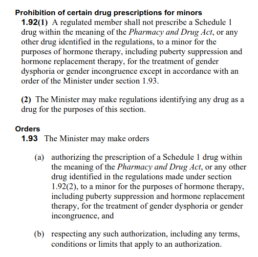
Back when the measure was first announced in a Twitter video at the end of January 2024, the Alberta Medical Association’s Pediatrics section (and later the AMA itself), the Canadian Pediatric Society and Amnesty International Canada have voiced their opposition, the bills being contrary to medical best evidence and practice. Skipping Stone, a Calgary-based organization serving the local 2SLGBTQ+ community, has promised to sue, and has subsequently filed a lawsuit alongside Égale Canada and fellow Albertan families with trans youth. More broadly speaking, mainstream medical organizations have unanimously come out against gender-affirming care bans, for the same reasons, and have held their position despite bullying by politicians.
The Education Amendment Act, 2024 is Canada’s worst anti-trans education bill thus far. First and foremost, it requires opt-in consent for sex ed — a measure targeting all youth in Alberta, and which not only denies 2SLGBTQ+ people’s ability to see themselves within said curriculum, but equally denies knowledge about consent, puberty, and the human reproductive system. Even for students whose parents opt-in their kids into said classes, Alberta school boards will be forbidden from using learning and teaching resources “that deal primarily and explicitly with gender identity, sexual orientation or human sexuality” without Ministerial approval.
As it pertains to trans youth though, it gets worse. Said bill forbids a student under age 16 from using a new chosen name or pronouns without parental consent. It also mandates, for all students under the age of majority (being 18 in Alberta), that the school board must notify the student’s parent(s) if the fact that said youth wishes to use a new chosen name or pronouns is brought to the attention of the school board, the school, or even just a teacher — forcibly outing their identity to their parents. Research by the U.S.-based Trevor Project in 2022 has revealed that fewer than one in three trans youth found home to be a safe space for them, as a trans person; for the other two in three youth, it can push them to consequences as severe as homelessness or suicide. Teachers and school staff are explicitly forbidden from using the chosen name or pronouns of their student in school unless said criteria is respected. The legislation explicitly states that this restriction only applies if the chosen name is chosen for gender identity-related reasons — a cisgender student, who say, wishes to go by Chris instead of Christopher, would not be affected, unless they are doing so because of their gender identity. Finally, said bill also forbids anyone from suing the government, schools, or school boards for any damages arising from forced outing, deadnaming or misgendering. Talk about arbitrary!
Finally, Bill 29, the Fairness and Safety in Sport Act creates a legislative framework requiring school boards, charter and private schools, public post-secondary institutions and provincial sport organizations to establish policies “respecting fairness and safety with respect to each relevant sport”. Said policies must then dictate “eligibility requirements to participate in the relevant sport” and processes to determine this, and “provisions or content prescribed by the regulations”. Danielle Smith has announced that the intent of the bill is to ban trans women from women’s sports teams, something which will be implemented through such regulations. This bill would even apply within the context of mandatory physical education courses, once again disproportionately impacting trans girls. Finally, similarly to the Education Amendment Act, a non-liability clause is included, to make sure that any affected trans person has no legal recourse whatsoever to sue the government.
These bills, as a whole, will have a devastating impact on trans youth, trans women, and trans people as a whole in Alberta. We can infer answers on how bad this impact would be from our southern neighbors. In U.S. states with anti-trans legislation passed into law, the incidence of suicide attempts per year among trans young people has increased, according to a study published in Nature, by up to 72%. As for the positive impacts of gender-affirming healthcare, they’re well-documented: outcomes are overwhelmingly positive, and enable trans youth to become well and healthy trans adults — instead of dead trans youth or unwell trans adults.
Whether these bills will stand up in court will depend on both the test of time, and whether the Alberta legislature invokes the notwithstanding clause of the Canadian Charter (update: they likely will). One thing remains certain though: the impacts of these bills cannot be understated.
